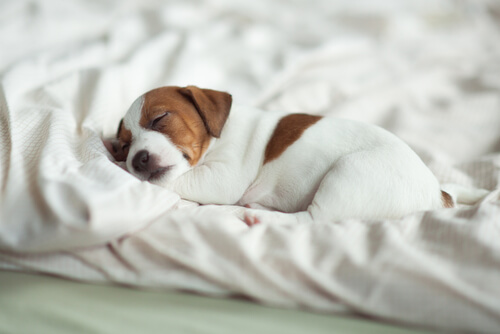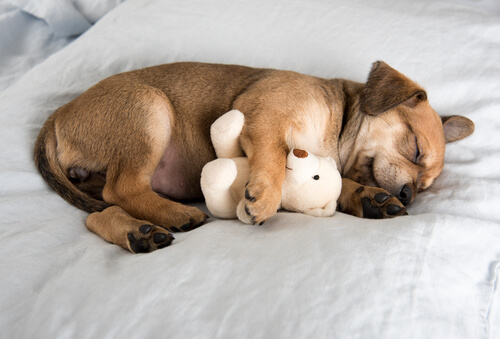Helping a Puppy Sleep Through the Night


Written and verified by biochemistry Luz Eduviges Thomas-Romero
Helping a puppy sleep through the night may not be as difficult as you had imagined. In many ways, having a puppy at home is like having a human baby. They’re cuddly and fun, although they also have the occasional tantrum.
Like their human counterparts, dogs are most active during the day. Even if they take frequent naps, they’ll go into a deep, extended sleep at night.
What to expect on your puppy’s first night
Your puppy’s first night at home will probably happen in one of two ways:
- Your puppy will be totally exhausted from the excitement of the day and will go to sleep immediately.
- Your puppy will have trouble settling in. Moving into a new home with strangers is a stressful event, even if everything seems to be going great.

Before you bring your puppy home, ask their breeder, foster family, or rescue organization for a toy, towel or small blanket that smells like your puppy’s mother or siblings, or his previous home at bedtime. These familiar scents will help him relax and settle in.
The younger your puppy is, the less likely they’ll be able to sleep through the night at first. Dogs don’t like to soil their sleeping areas. For this reason, if your puppy needs to go to the bathroom during the night, they’ll start whining and crying.
When you hear them cry, take them outside for a walk, then bring them inside and place them back in their crate. Most puppies sleep through the night at three or four months of age, at which point they’re ready for a dog bed.
Exercise, one of the best ways to help your puppy sleep through the night
Getting your dog to exercise intensely a few hours before bedtime is an almost foolproof way to help your puppy sleep through the night. However, you should know that if you do it immediately before bedtime, your puppy will still be very excited and will have trouble falling asleep.

Pick up the water!
If your dog drinks a lot of water, leave a little water in the bowl, but not the bowl full. Leave just a little water in the bowl and put some ice cubes in it. That way, your dog can distract himself by chewing on the cubes and the ice will give him enough water to stay hydrated without filling his bladder.
Hungry?
You know how uncomfortable it is to go to sleep on an empty stomach. You lie down to sleep, but can’t fall asleep, and, soon after, you’re staring at the refrigerator with your pup by your side.
Likewise, an empty belly can also keep your dog awake. Evaluate your puppy’s meal schedule; you may not be feeding your pet enough, or not early enough. Pay attention to whether your puppy sleeps better with something in their stomach.
Leave a radio on to help your puppy sleep through the night
Some dogs simply can’t stand too much silence; silence increases their anxiety. Leave the radio on low volume, preferably on a talk show or weather channel, instead of music. The sound of voices can comfort and help your puppy sleep through the night.
Should I leave my puppy in bed with me?
If your puppy is already house-trained and you enjoy cuddling, then by all means yes. If this isn’t the case, it’s time to set ground rules. You must train your puppy to be able to spend time calmly. If a puppy understands that they’re in a safe place, then they’ll be able to sleep comfortably through the night.
All cited sources were thoroughly reviewed by our team to ensure their quality, reliability, currency, and validity. The bibliography of this article was considered reliable and of academic or scientific accuracy.
- Cannas, S., Frank, D., Minero, M., Godbout, M., & Palestrini, C. (2010). Puppy behavior when left home alone: Changes during the first few months after adoption. Journal of Veterinary Behavior-Clinical Applications and Research, 5(2), 94–100.
- Guardini, G., Bowen, J., Mariti, C., Fatjó, J., Sighieri, C., & Gazzano, A. (2017). Influence of maternal care on behavioural development of domestic dogs (Canis familiaris) living in a home environment. Animal, 7(12), 93.
- Duxbury, M. M., Jackson, J. A., Line, S. W., & Anderson, R. K. (2003). Evaluation of association between retention in the home and attendance at puppy socialization classes. Javma-Journal of The American Veterinary Medical Association, 223(1), 61–66.
This text is provided for informational purposes only and does not replace consultation with a professional. If in doubt, consult your specialist.